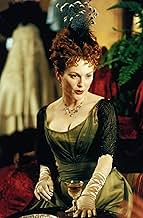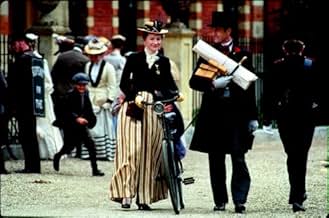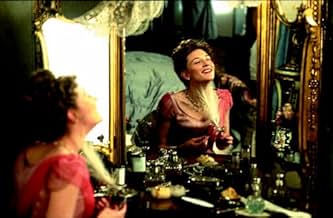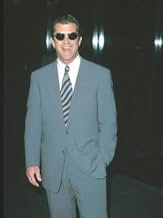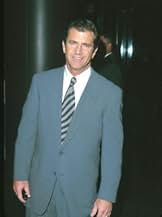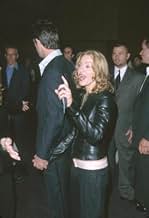IMDb रेटिंग
6.8/10
17 हज़ार
आपकी रेटिंग
अपनी भाषा में प्लॉट जोड़ेंLondon 1895: Cabinet minister, Sir Chiltern, and bachelor, Lord Goring, are victims of scheming women.London 1895: Cabinet minister, Sir Chiltern, and bachelor, Lord Goring, are victims of scheming women.London 1895: Cabinet minister, Sir Chiltern, and bachelor, Lord Goring, are victims of scheming women.
- 3 BAFTA अवार्ड के लिए नामांकित
- 4 जीत और कुल 17 नामांकन
फ़ीचर्ड समीक्षाएं
It's quite a long time that i haven't seen such a perfect movie: a highly talented cast, a lavishing setting and a finely chiseled and powerful script.
Here, you got an all-star team: Driver as the eccentric but romantic young woman (unfortunately a falling star that hasn't shine for a long time), Moore as the Machiavellian lonely woman, Everett as the helpful friend, "Sir Robert" as the courageous man and ... Blanchet as the lovely wife whom characterization deeply moved me. In my tumultuous life, i was just wondering what's the special gift a woman can offer (me) to fall in love: beauty, wit, sensuality, wealth, power? Gertrude has nothing of that but her kindness, her attention, her devotion left me under the spell. She could become easily my ideal wife.
Then, the story happens in the Victorian time for which i have also a strong tie. I just really appreciate the British phlegm: you can say the more vile things but always with class. Here, you find cupidity, blackmail, lies, ambition but there's nor a fight nor a shout!
At last, the script is really well written: you don't know if this is a romance, a buddy movie, a thriller or a tragedy. I really like the morals questions the movie asks: can a bad action be redeemed? How can a true friend be helpful? Does love live with lies? The answers are not brought in a dull, academic patronizing way but playfully because all the characters seems to orbit around each other!
In conclusion, it's a sort of lighter and happier "Carlito's way" thus a great movie that is maybe really unknown.
Here, you got an all-star team: Driver as the eccentric but romantic young woman (unfortunately a falling star that hasn't shine for a long time), Moore as the Machiavellian lonely woman, Everett as the helpful friend, "Sir Robert" as the courageous man and ... Blanchet as the lovely wife whom characterization deeply moved me. In my tumultuous life, i was just wondering what's the special gift a woman can offer (me) to fall in love: beauty, wit, sensuality, wealth, power? Gertrude has nothing of that but her kindness, her attention, her devotion left me under the spell. She could become easily my ideal wife.
Then, the story happens in the Victorian time for which i have also a strong tie. I just really appreciate the British phlegm: you can say the more vile things but always with class. Here, you find cupidity, blackmail, lies, ambition but there's nor a fight nor a shout!
At last, the script is really well written: you don't know if this is a romance, a buddy movie, a thriller or a tragedy. I really like the morals questions the movie asks: can a bad action be redeemed? How can a true friend be helpful? Does love live with lies? The answers are not brought in a dull, academic patronizing way but playfully because all the characters seems to orbit around each other!
In conclusion, it's a sort of lighter and happier "Carlito's way" thus a great movie that is maybe really unknown.
An Ideal Husband - ****
In 19th Century London, Sir Robert Chiltern (Jeremy Northam,) is a successful member of parliament married to the virtuous, fabulously popular Lady Gertrud Chiltern (Cate Blanchett.) Sir Robert's sister Mabel (Minnie Driver) is infatuated with Sir Robert's friend, Lord Arthur Goring (Rupert Everett.) The dashing Lord Goring, the wealthy son of the Earl of Caversham, is an inveterate bachelor who lives a life of leisure. Into this already crowded picture drops Mrs. Laura Cheveley (Julianne Moore,) an Austrian socialite with two ex-husbands and a convoluted past. Not only was she briefly engaged to Lord Goring, but it seems that she possesses evidence that the noble Sir Robert once committed a terrible indiscretion. Mrs. Cheveley uses this explosive evidence in her attempt to blackmail Sir Robert into voting against his conscience on the floor of Parliament. What ensues is a fascinating examination of honor and idealism. We learn that the noble Sir Robert is less than perfect, while the rakish bachelor Lord Goring possesses a surprising level of honor and insight.
If Shakespeare in Love deserved an Oscar, this film deserves the Nobel Prize. It is simply outstanding in every respect. The first thing one notices is the dialogue. It is a bit stiff and stilted, as was the custom in London at the time, but it also possesses a razor sharp wit and sly sense of humor. Every last character speaks with intelligence and humor. The verbal fireworks, particularly as provided by Lord Goring, illuminate character and motivation while simultaneously producing guffaws from the audience. The plot structure is a marvel. There are no explosions, fireballs, or car chases, but the picture achieves a certain breathlessness simply through its intricate layering of multiple characters, all with intertwining motivations, interests, and connections with one another. A prime example of this is the scene in which poor Lord Goring receives multiple visitors at his home in a single night. All of the visitors have conflicts with one another, so Lord Goring must segregate them and move from room to room, listening to their problems and providing insights. The costumes and locations are all excellent. I particularly liked the manner in which Sir Robert's bright home is contrasted with Lord Goring's dark and cavernous bachelor pad. The one complaint I have is with the film's music; it seemed too light and frivolous, overplaying the "madcap shenanigans" element of the picture. But this is a minor quibble indeed.
The acting is first rate across the board. Jeremy Northam (yes, he could play James Bond) is well suited to the role of Sir Robert. He exudes intelligence, honor, and duty. Julianne Moore, as Mrs. Cheveley, seems to relish the conniving and scheming of her character. Cate Blanchett and Minnie Driver capably bring depth and intelligence to their limited roles. But the true star of the film is Rupert Everett as Lord Arthur Goring. Mr. Everett has had a promising career to this point, but An Ideal Husband is his breakout role. In this film he is witty, charming, caring, wise, devilish, and childish all at once. Lord Goring is the kind of man that makes women swoon and men flock around to hear funny stories. He reminded me of Cary Grant - only better. Someone give that man an Academy Award.
In 19th Century London, Sir Robert Chiltern (Jeremy Northam,) is a successful member of parliament married to the virtuous, fabulously popular Lady Gertrud Chiltern (Cate Blanchett.) Sir Robert's sister Mabel (Minnie Driver) is infatuated with Sir Robert's friend, Lord Arthur Goring (Rupert Everett.) The dashing Lord Goring, the wealthy son of the Earl of Caversham, is an inveterate bachelor who lives a life of leisure. Into this already crowded picture drops Mrs. Laura Cheveley (Julianne Moore,) an Austrian socialite with two ex-husbands and a convoluted past. Not only was she briefly engaged to Lord Goring, but it seems that she possesses evidence that the noble Sir Robert once committed a terrible indiscretion. Mrs. Cheveley uses this explosive evidence in her attempt to blackmail Sir Robert into voting against his conscience on the floor of Parliament. What ensues is a fascinating examination of honor and idealism. We learn that the noble Sir Robert is less than perfect, while the rakish bachelor Lord Goring possesses a surprising level of honor and insight.
If Shakespeare in Love deserved an Oscar, this film deserves the Nobel Prize. It is simply outstanding in every respect. The first thing one notices is the dialogue. It is a bit stiff and stilted, as was the custom in London at the time, but it also possesses a razor sharp wit and sly sense of humor. Every last character speaks with intelligence and humor. The verbal fireworks, particularly as provided by Lord Goring, illuminate character and motivation while simultaneously producing guffaws from the audience. The plot structure is a marvel. There are no explosions, fireballs, or car chases, but the picture achieves a certain breathlessness simply through its intricate layering of multiple characters, all with intertwining motivations, interests, and connections with one another. A prime example of this is the scene in which poor Lord Goring receives multiple visitors at his home in a single night. All of the visitors have conflicts with one another, so Lord Goring must segregate them and move from room to room, listening to their problems and providing insights. The costumes and locations are all excellent. I particularly liked the manner in which Sir Robert's bright home is contrasted with Lord Goring's dark and cavernous bachelor pad. The one complaint I have is with the film's music; it seemed too light and frivolous, overplaying the "madcap shenanigans" element of the picture. But this is a minor quibble indeed.
The acting is first rate across the board. Jeremy Northam (yes, he could play James Bond) is well suited to the role of Sir Robert. He exudes intelligence, honor, and duty. Julianne Moore, as Mrs. Cheveley, seems to relish the conniving and scheming of her character. Cate Blanchett and Minnie Driver capably bring depth and intelligence to their limited roles. But the true star of the film is Rupert Everett as Lord Arthur Goring. Mr. Everett has had a promising career to this point, but An Ideal Husband is his breakout role. In this film he is witty, charming, caring, wise, devilish, and childish all at once. Lord Goring is the kind of man that makes women swoon and men flock around to hear funny stories. He reminded me of Cary Grant - only better. Someone give that man an Academy Award.
I saw "An Ideal Husband" at the Old Vic theater in London, and was surprised at the time how timely a 100 year old play could be.
When I saw the trailers, TV ads and posters for this version, it seemed like an entirely different story--will Rupert Everett get married off. That's certainly a thread in the movie, but in the marketing of this version, they made it appear as if it was the entire wardrobe.
I didn't see the film when it was in theaters because these ads, with their very modern music and fast cutting, made the film look like a joke.
But when it came out on video, I decided to try it, and am glad I did.
The film itself is excellent. Beautifully shot and paced, with an expert cast. Wilde's humor shines through, and the writer-director has done a wonderful job "opening" up the play into a film, without changing anything important. It's a masterful job of translating from stage to screen. It's really so crisply done, and very funny.
In years to come people will realise that this is a fine movie version of this play. And by then, hopefully, they will have either forgotten about the marketing campaign, or hopefully learned from it.
I recommend the film.
When I saw the trailers, TV ads and posters for this version, it seemed like an entirely different story--will Rupert Everett get married off. That's certainly a thread in the movie, but in the marketing of this version, they made it appear as if it was the entire wardrobe.
I didn't see the film when it was in theaters because these ads, with their very modern music and fast cutting, made the film look like a joke.
But when it came out on video, I decided to try it, and am glad I did.
The film itself is excellent. Beautifully shot and paced, with an expert cast. Wilde's humor shines through, and the writer-director has done a wonderful job "opening" up the play into a film, without changing anything important. It's a masterful job of translating from stage to screen. It's really so crisply done, and very funny.
In years to come people will realise that this is a fine movie version of this play. And by then, hopefully, they will have either forgotten about the marketing campaign, or hopefully learned from it.
I recommend the film.
7=G=
"An Ideal Husband" is a charming though contrived little 19th century English period comedy with the subtly sardonic sense of humor typical of Oscar Wilde. The film, which deals with the politics of society first, the politics of the heart second, and the politics of the state last, features all the trappings of the period, a solid cast, and a clever script. An amusing and enjoyable watch for those into 19th century English period films.
If I weren't so lazy, I would have checked the original play to see if my favorite line from the movie was in it:
Goring's father: I use nothing but my common sense. Goring: So my mother tells me.
Even if was concocted for the film, that line still contains the essence of Wilde and the essence of all modern British humor, for which, I should say, I'm a major sucker. While watching An Ideal Husband, I didn't object to the lack of suspense as long as Rupert Everett was working his way around those Wilde lines, which he does as well as anyone I've ever heard.
I used to think Stephen Fry was Wilde on earth, but Fry is something wonderfully different -- Everett is Wilde on earth, or at least the actor that Wilde should have had around to deliver those lines when he wrote them. I first saw Everett in The Madness of King George, for which he put on weight. Every review of that film mentioned this; I thought the attention excessive, but when I saw him lying shirtless in a sauna, I understood. The man is, shall we say, cut. I can only imagine the effect of that scene on straight women or gay men -- probably something akin to the effect Greta Scacchi's "I think we're alone now" smile at the end of The Coca-Cola Kid has on me.
An Ideal Husband is full of good performances, with one glaring exception: the usually great Julianne Moore. Her scenes are curiously leaden, and Parker -- whose fault this may be -- has the camera linger over her as though the exposure will convince us how evil she is. The one exception is her scene with Everett, which has a real "Will he sleep with the enemy?" tension. It may be that Moore was just outclassed by the Brits, who are born to this stuff.
Cate Blanchett, whom I've seen in three movies, two of which were British period pieces, continues to amaze me with her range.
The unsung hero of the movie is Jeremy Northam, who takes a thankless role -- the man in the play who isn't the Oscar Wilde figure -- and makes it emotionally compelling. He is responsible for the play's only real suspense and emotion, since the rest is word games, more or less.
All of which leads me to blame the production's shortcomings on its writer/director, Oliver Parker. He seems to have squandered an outstanding cast. The play's final scene is played as a series of French scenes -- a film term for a series of different scenes in the same location -- and this kills any momentum that scene might have had.
Three out of four stars, I say, which makes it better than 90% of the movies out there.
Goring's father: I use nothing but my common sense. Goring: So my mother tells me.
Even if was concocted for the film, that line still contains the essence of Wilde and the essence of all modern British humor, for which, I should say, I'm a major sucker. While watching An Ideal Husband, I didn't object to the lack of suspense as long as Rupert Everett was working his way around those Wilde lines, which he does as well as anyone I've ever heard.
I used to think Stephen Fry was Wilde on earth, but Fry is something wonderfully different -- Everett is Wilde on earth, or at least the actor that Wilde should have had around to deliver those lines when he wrote them. I first saw Everett in The Madness of King George, for which he put on weight. Every review of that film mentioned this; I thought the attention excessive, but when I saw him lying shirtless in a sauna, I understood. The man is, shall we say, cut. I can only imagine the effect of that scene on straight women or gay men -- probably something akin to the effect Greta Scacchi's "I think we're alone now" smile at the end of The Coca-Cola Kid has on me.
An Ideal Husband is full of good performances, with one glaring exception: the usually great Julianne Moore. Her scenes are curiously leaden, and Parker -- whose fault this may be -- has the camera linger over her as though the exposure will convince us how evil she is. The one exception is her scene with Everett, which has a real "Will he sleep with the enemy?" tension. It may be that Moore was just outclassed by the Brits, who are born to this stuff.
Cate Blanchett, whom I've seen in three movies, two of which were British period pieces, continues to amaze me with her range.
The unsung hero of the movie is Jeremy Northam, who takes a thankless role -- the man in the play who isn't the Oscar Wilde figure -- and makes it emotionally compelling. He is responsible for the play's only real suspense and emotion, since the rest is word games, more or less.
All of which leads me to blame the production's shortcomings on its writer/director, Oliver Parker. He seems to have squandered an outstanding cast. The play's final scene is played as a series of French scenes -- a film term for a series of different scenes in the same location -- and this kills any momentum that scene might have had.
Three out of four stars, I say, which makes it better than 90% of the movies out there.
क्या आपको पता है
- ट्रिवियाWhen Mrs. Chevely discovers Gertrude's letter, it is laying atop a yellow book with an Aubrey Beardsley illustration on the cover. This is apparently a copy of The Yellow Book, which was a Victorian magazine of sorts. When Oscar Wilde was arrested on charges of sodomy in 1895, he was carrying what appeared to be The Yellow Book, and because of this association, the publication was ruined.
- गूफ़At the reception at the Chiltern's home, Sir Robert is requested to meet the Indian Ambassador. In 1895 India was a British possession and there could not be such an Ambassador who represents only independent states.
- भाव
Lord Caversham: What are you doing here, sir? Wasting your time, as usual?
Lord Arthur Goring: My dear father, when one pays a visit, it is for the purpose of wasting other people's time and not one's own.
- क्रेज़ी क्रेडिटThe credits list Oliver Parker, the director, as playing "Bunbury", one of the gentlemen that is seen playing cards with Lord Goring in the Men's Club when Lord Chiltern arrives. Bunbury is also a never-seen character in "The Importance of Being Earnest", the play which is performed in the background of several scenes of this film.
टॉप पसंद
रेटिंग देने के लिए साइन-इन करें और वैयक्तिकृत सुझावों के लिए वॉचलिस्ट करें
- How long is An Ideal Husband?Alexa द्वारा संचालित
विवरण
- रिलीज़ की तारीख़
- कंट्री ऑफ़ ओरिजिन
- आधिकारिक साइट
- भाषा
- इस रूप में भी जाना जाता है
- Ідеальний чоловік
- फ़िल्माने की जगहें
- उत्पादन कंपनियां
- IMDbPro पर और कंपनी क्रेडिट देखें
बॉक्स ऑफ़िस
- बजट
- $1,40,00,000(अनुमानित)
- US और कनाडा में सकल
- $1,85,42,974
- US और कनाडा में पहले सप्ताह में कुल कमाई
- $1,92,802
- 20 जून 1999
- दुनिया भर में सकल
- $1,85,42,974
- चलने की अवधि1 घंटा 37 मिनट
- ध्वनि मिश्रण
- पक्ष अनुपात
- 1.85 : 1
इस पेज में योगदान दें
किसी बदलाव का सुझाव दें या अनुपलब्ध कॉन्टेंट जोड़ें



